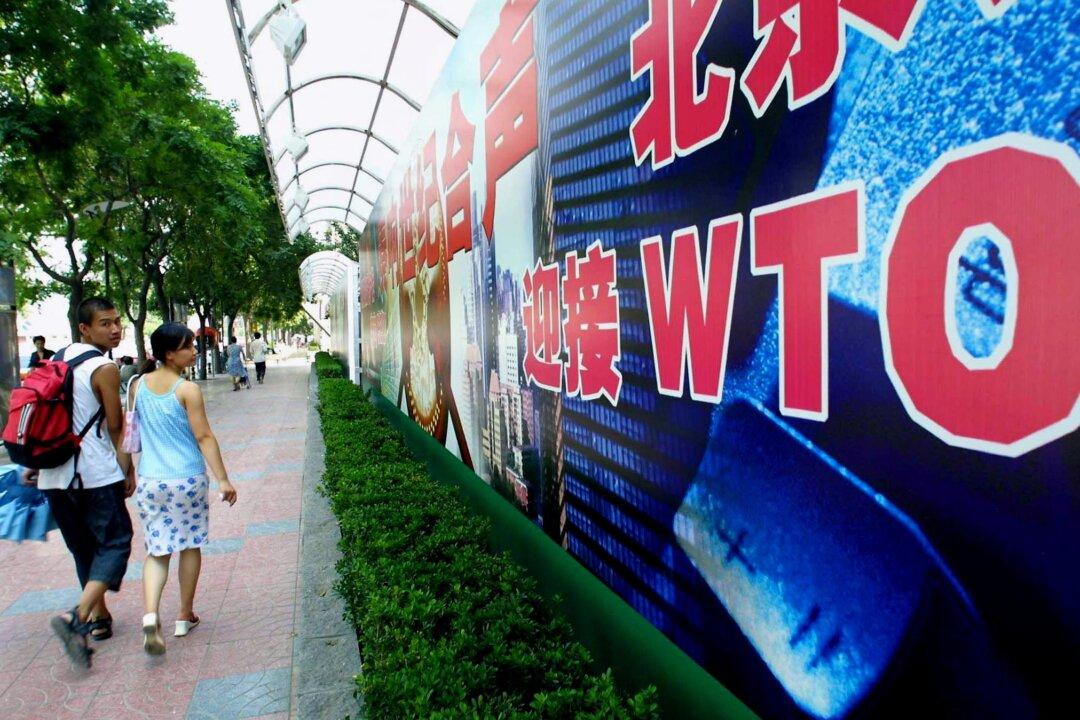A new report has confirmed what many economists and policymakers have long held: China’s ascension to the World Trade Organization has cost the U.S. economy greatly.
Between 2001, when China first entered the WTO, and 2017, the number of U.S. jobs lost as a result of the expanding bilateral trade deficit totaled 3.4 million, according to a new analysis published Oct. 23 by the Economic Policy Institute, a U.S.-based think tank. Nearly three-quarters of those were in manufacturing, with every state and congressional district affected.
Workers who were displaced from jobs were pushed into occupations where they earned less, resulting in a net wage loss of roughly $37 billion a year between 2001 and 2011, due to trade with China, according to the report.
The current trade deficit with China stands at $50.1 billion, a record high, according to data from the U.S. Commerce Department.
The report’s findings effectively argue in favor of the U.S. administration’s hardline stance against China on trade issues.
“The U.S.–China trade relationship needs to undergo a fundamental change,” the report authors conclude. “Addressing unfair trade, weak labor, and environmental standards in China, and ending currency manipulation and misalignment, should be our top trade and economic priorities with China.”
‘A Win-Win Result’
The report authors note that the United States had early on supported China’s entry into the WTO, with the argument that access to the Chinese market would lead to an increase in U.S. exports, create jobs for Americans, and shrink the trade deficit.
In 2000, then-President Bill Clinton had said the agreement negotiated for China’s entry would create “a win-win result for both countries.”
But the result, nearly two decades later, is to the contrary. The report calls out China for “trade-distorting practices” such as providing subsidies to domestic industries and supporting state-owned firms, which resulted in an excess capacity to produce goods that far surpassed domestic consumer demand.
“China dealt with the oversupply by dumping the exports elsewhere, primarily in the United States,” the report said.
The Chinese regime also engaged in currency manipulation, which compounded the effects of the U.S. market being flooded by cheap Chinese goods.
The report’s authors reached the job-loss numbers by subtracting the job opportunities lost to imports from those gained through exports. Because imports from China increased dramatically while exports to China grew much less, the United States lost jobs in manufacturing sectors such as electronics and other high-tech areas; textiles; primary metals; and machinery. The country also missed out on opportunities to grow jobs in key export industries.
The computer and electronic-parts industry was the hardest-hit, losing more than 1.2 million jobs, which accounted for 36 percent of the total loss.
Unsurprisingly, China now dominates in this industry, with the world’s biggest tech firms manufacturing their goods in China.
The 10 states most affected by the lost jobs, when looking at job loss as a share of total state employment, were New Hampshire, Oregon, California, Minnesota, North Carolina, Rhode Island, Massachusetts, Vermont, Wisconsin, and Texas.
The report also projected how different the U.S. economy would look if U.S. exports to China had increased at the same rates as Chinese exports to the United States.
U.S. exports to China would have grown to $486.4 billion, with the following industries reaping the most benefits: transportation equipment (increasing exports by $111.7 billion); agriculture ($71.0 billion); computer and electronic parts ($61 billion); chemicals ($56.6 billion); machinery ($33.6 billion); and food and beverage products ($12.8 billion).





